Who became the People of the Volga: from monarchists to Zionists
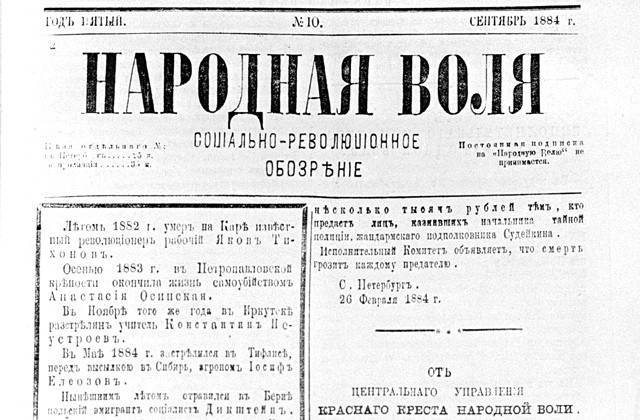
After the defeat of the organization “Narodnaya Volya” in 1880-s, many of its former members became leaders or ideologues of various political forces.
Officially, "Narodnaya Volya" ceased to exist in 1887. The historian Frice wrote then in the article “The Collapse of the People’s Will”: The defeat of the “People’s Will” was first of all equivalent to the collapse of the faith in the omnipotence of the intelligentsia, historical mission, in its creative power. "
However, Fritsche hastened to wishful thinking. “Narodnaya Volya” was formed after the split of the Narodnik “Earth and Volition” into “Black Redistribution” and “Narodnaya Volya”. Blackmen relied on the propaganda of socialist ideas among the peasantry and among the urban workers. And “Narodnaya Volya” quickly rose to more radical positions, considering that the revolution could be pushed by terror. It was the 1 March People 1881 that killed Tsar Alexander II. The reaction of society turns out to be quite different from what the radical revolutionaries were counting on. The tsarist government was soon able to crush the remaining organization in isolation.
“Narodnaya Volya” did not die without a trace, but gave birth to new political, social and even scientific movements in Russia. Active people of the People created Marxist movements, the Jewish organization of the BUND, “civilized monarchism” and Russian nationalism. In fact, almost all the Russian political forces of that time grew out of Narodnaya Volya.
Stepan Khalturin: classic folklore
3 of April (22 of March) in Odessa was executed an accomplice in the murder of the prosecutor of the city Vasily Strelnikov. Four days earlier, the prosecutor hated by revolutionaries was shot dead on Primorsky Boulevard with a revolver in the back of the head. The terrorists tried to escape, but were detained by passersby.
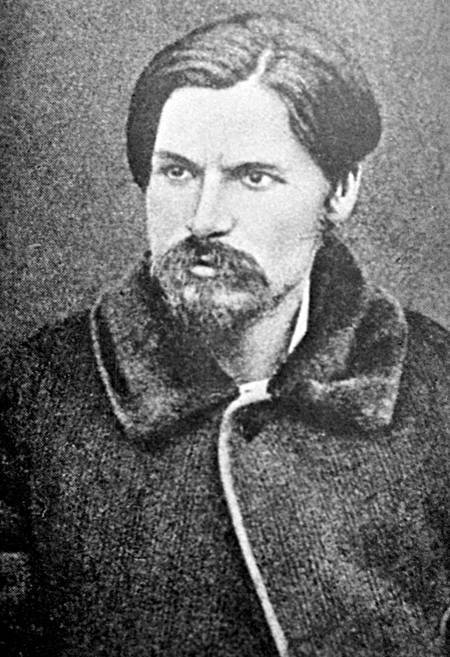
During the interrogation, they presented themselves with fictitious names, after three days Tsar Alexander III's order came to Odessa to “judge the murderers by military law, and that they would be hanged in 24 hours without any excuses”.
The next morning, two terrorists are executed, their names will be known later. The direct killer of Strelnikov was Nikolai Zhelvakov, and his assistant was Stepan Khalturin. It was Khalturin who, two years before, had organized an explosion in the Tsar's Winter Palace. After the murder of the 1 king in March 1881, the Narodnaya Volya party was practically crushed, but Khalturin avoids arrest and campaigns for two years in the south of the country, before the murder of Strelnikov.
The future revolutionary was born in the family of well-to-do peasants, early in love with the People's Literature. He was expelled from Vyatka Zemstvo Teachers' Seminary in 1875 for poor academic performance. By this time, with a group of like-minded people, he decides to go to America and establish a commune. But fellow travelers stole Khalturin's passport and left Petersburg with him. Khalturin, left without documents and livelihoods, undertakes a variety of temporary work until he joins railway workshops. He quickly got acquainted with the Petersburg populists, in particular with Georgy Plekhanov. During the split of the populist "Land and Will" Khalturin supports supporters of terror.
By 1879, a revolutionary under the name of Stepan Batyshkov gets to work on the imperial yacht. The tsarist official likes his work, and in the fall he is hired for carpentry work in the Winter Palace. Khalturina is settled in the basement, here it brings dynamite in small portions, only about two pounds (more than 30 kg). The goal of the People at the time was to kill the king, Khalturin planned to blow up Alexander II during lunch. The premises of the People's Carpenter were located two floors below the dining room. By chance, the king was far away during the explosion, he met the Empress's late brother. In addition, the overlap between the floors were reliable, none of the royal family was hurt. Killed 11 soldiers from the guardroom, located between the room Khalturina and the dining room, another 56 people were injured. Khalturin was never arrested; on the orders of Narodnaya Volya, he went to Moscow, and only then to the south.
In Soviet times, Khalturin was one of the most revered people of the People, including because of the great sympathy for him of the Bolshevik leader Vladimir Lenin. The creator of the Soviet state repeatedly mentioned the Worker of the People’s Freedom in his works, and the leader’s office in the Kremlin was decorated with high-reliefs of Marx and Khalturin.
BUND
By the fall of 1881, of the 28 members of the executive committee of Narodnaya Volya, only eight people remained free (the rest were either executed or convicted). Young Popularists came to power in HB, among whom stood 26-year-old Jew Savely Zlatopolsky. At the same time, six new members were admitted to the executive committee, which is remarkable - all are not Jews. Lebedev and Romanenko became the leaders of this non-Jewish part.
In the same year 1881 in connection with the murder of Tsar Alexander II in Russia, a wave of Jewish pogroms swept. “Narodnaya Volya” could not remain aloof from such events and published a proclamation. This paper struck a large part of the Russian intelligentsia, and especially the Jews: NB came out in support of the Jewish pogroms!
Romanenko was the author of this anti-Semitic proclamation (later he became the editor of the anti-Semitic newspaper Bessarabets). In the 6 number of the Narodnaya Volya magazine, Romanenko wrote:
“All the attention of the defending people is now focused on merchants, tabernacles, usurers, in a word, on Jews, this local“ bourgeoisie, ”hastily and passionately, like nowhere, robbing working people.
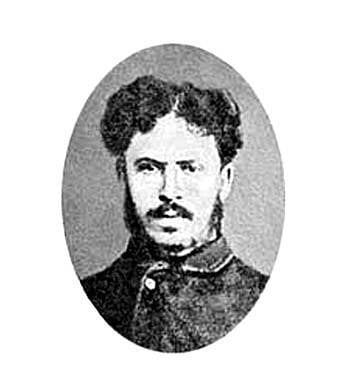
The Jew and the de facto head of HB Savely Zlatopolsky at that time was full of indignation and ordered the rest of the magazine to be destroyed with an anti-Semitic article. But the inner faction of anti-Semites (she called herself a “working faction”) in the “Narodnaya Volya” was unstoppable. The Russian part of the organization took over, the Jews began to be squeezed out of HB, but more often, they left. Moreover, a certain part of the People’s People themselves participate in the pogroms, justifying this by the fact that they “expropriate money from the Jews for revolution”.
Two years later, in the “Supplement” to the “Liszt Narodnaya Volya”, published in July 1883, a new article appeared “Concerning Jewish Riots” (written by Lebedev). She finally designed the "new course" HB. In it, the Jewish pogroms were interpreted as the beginning of the national movement, “but not against Jews as Jews, but against“ Jews, ”that is, national exploiters. "The people are well aware that the authorities support them not at all as Jews, not as oppressed people and, moreover, not as intellectual force, which they cruelly persecute, but only as Jews, that is, people who help keep people in bondage, and as people sharing with him, giving him bribes, ”the article said.
By the end of the article, the author found it necessary to recall that the Great French Revolution began with the beating of Jews, and referred to Karl Marx, “who once beautifully explained that the Jews reproduce as a mirror (and not even in an ordinary, but elongated) all the vices of the environment, all the ulcers of the social system, so that when the anti-Jewish movements begin, you can be sure that there is a protest against the whole order and a much deeper movement. ”
Narodovolets Deitch wrote to Axelrod about the new, anti-Semitic course of Narodnaya Volya: “The Jewish question is now, in practice, almost insoluble for a revolutionary. Well, for example, they now do in Balta, where they beat the Jews? To intercede for them is to incite hatred against revolutionaries "who not only killed the king, but also support the Jews." And they have to be between two contradictions. This is simply a hopeless contradiction for both Jews and revolutionaries, in practice and in action. ”
It is not surprising that the same Deutsch and Axelrod began to lean towards Marxism, which at that time only penetrated into Russia. “Narodnaya Volya” not only for them, but also for other Jews who were members of this organization, became hostile.
The second movement, after Marxism, where the Jews, the people of the People, were forced to go, was the Zionist organizations. The first purely Jewish workers' circles appeared in Minsk as early as 1883. Their founder was Chaim Khurgin, later a prominent Zionist. And in 1884 — 1885, Zionism began to conquer other cities of the Western Russian Empire.
But the real “explosion” was expected by Jewish socialist organizations. At the beginning of 1890, a group of Jewish socialists organized the “Universal Jewish Workers' Union in Lithuania, Poland and Russia” - in Yiddish, the abbreviation BUND. Among the founding fathers of this organization were many former People. For example, one of them, Isai Eisenstadt, already being in emigration in Germany, in 1920, recalled the process of organizing BUNDA: “We borrowed eighty percent of the program of“ Narodnaya Volya ”during its heyday - people's socialism. And the remaining twenty percent is already a Jewish agenda. ”
In the end, it was on the basis of the BUND that the RSDLP also grew (both the Bolsheviks and the Mensheviks - after their separation).
Monarchists
Several prominent people of the People initiated a "civilized" (as they themselves called it) monarchism. The transition from radical, terrorist socialism to the full, burgher version of “Orthodoxy, autocracy and nationality” was made by Ivan Petrov, Lev Tikhomirov and about ten former populists. The most prominent figure among them was Lev Tikhomirov.
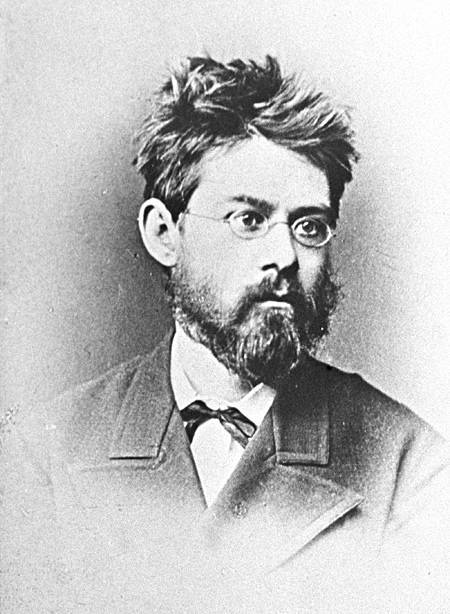
Tikhomirov caught the heyday of the movement. In 1873, he was arrested, then spent four years in prison in the Peter and Paul Fortress. In 1877, the populist is free, already, as he said himself, as an "authoritative revolutionary".
Lev Tikhomirov became a member of the Executive Committee, the Selection Commission and the editorial board of Narodnaya Volya. But the main thing - he is recognized as the main theorist and ideologist of the organization.
After the murder of Alexander II, with the onset of reaction in the country, Tikhomirov fled abroad. In 1882, in Geneva, he proposes that another prominent Popularist, subsequently the founder of the Russian Marxist movement, Georgy Plekhanov, create the Foreign Center HB. He does not believe in the prospects for Narodnogolovstvo and advises Tikhomirov to study anarchism or Marxism - it is they, as Plekhanov says, that in the future they will raise Russia on a buck.
Tikhomirov falls into depression. He moved to Paris and there, by inertia, he edited for several years the "Bulletin of the" Narodnaya Volya "." Psychosomatic diseases lead Tikhomirov to Orthodox fanaticism. He was distinguished by deep faith even in the years of leadership by Narodnaya Volya. Vera Figner recalled the Russian period of his passion for religion:
“Lev Tikhomirov is our recognized ideological representative, theorist and best writer, already in 1881, distinguished by some oddities and, perhaps, who wore in his soul the beginnings of a psychological upheaval that led him to a complete change of the previous ideology and made him a revolutionary and a republican monarchist, from an atheist - a religious bigot, and from a socialist - like-minded Katkov and Gringmouth.
Back in March days (1881 of the year. - RP) in Petersburg, he astounded us. So, after 1 in March, he came to us with a mourning bandage on the sleeve, which was worn by the military and officials on the occasion of the death of Alexander II. Another time, he said that he went to church and took the oath to the new emperor. We did not know how to explain this comedy, but, according to Tikhomirov, it was necessary to legalize it in the eyes of a janitor who is so curious that he climbs into an apartment when the owners are not at home. Spy mania seems to have mastered him. So, in Moscow, while living in furnished rooms, he imagined that the neighbors had made a hole in the wall and were eavesdropping on conversations in his room. Immediately he left this apartment and went on a pilgrimage to the Trinity Sergius Lavra. ”
In Paris, Tikhomirov exhausting himself with hours of prayers and fasting. His wife recalled that spying did not leave Leo there: “He never walked a straight path, only a roundabout. He was looking for holes in the apartment through which the Russian police peered him and overheard. ”
In May 1888, Tikhomirov finished his book "Why I ceased to be a revolutionary." In August, the book was published in small edition in Paris. He sends a copy of the book to the Deputy Minister (Deputy Minister - RP) of the internal affairs of Plehve, along with a petition for returning to his homeland. In October, 1888, Lev Tikhomirov addresses Alexander III with a letter of pardon. He receives the answer: an amnesty and five years of public oversight.
In January, 1889, Tikhomirov leaves Paris, and his family soon returns to Russia. The “repentant revolutionary” was beneficial to the Ministry of Internal Affairs, and it is, as they say, leads Tikhomirov through life. He is satisfied with the editor at Moscow Gazette at a higher rate - 180 rubles per month (of which the Ministry of Internal Affairs pays 100 rubles). The army colonel received the same amount at that time.
In July, 1890, by the highest order, police supervision was removed from Tikhomirov. Together with the philosopher Konstantin Leontyev, he creates a secret social organization to counter the revolutionary movement - again under the patronage of the Ministry of Internal Affairs (the secret police for this activity still pays for Tikhomirov - 100 rubles a month).
When life becomes well secured by the efforts of the Ministry of Internal Affairs, Lev Tikhomirov gets the opportunity to work on books. The main one is the capital work "Monarchical statehood". In it, he advocates the idea of a synthesis of autocracy and popular representation (that same “civilized monarchism”). Tikhomirov writes that it is necessary to fight not only with the revolutionary movement in the country. “The main enemy of Russia is liberalism. He is the main culprit in revolutionizing Russian society. ” Tikhomirov proposes that monarchies (through the work of the Ministry of Internal Affairs, as was the case in his case) attract "capable intellectuals to statehood. And who does not agree - then let them blame themselves. ” It was Tikhomirov who developed the foundations of interaction between the authorities and the intelligentsia, which then will become fundamental for all Russian regimes (up to the present).
In the wake of the success of his ideas in power Tikhomirov again overtakes psychosomatic disorder. Only now it seems to him that not the secret police is spying on him, but Jews and liberals. He and his family are seeking salvation in Sergiev Posad, where he daily prays in churches.
In 1919, he publicly repents his monarchical and provocative activity. The Bolsheviks, remembering his merits during the period of populism, forgive Tikhomirov. He dies by his death 16 October 1923 of the year in Zagorsk.
Russian nationalism
For the first time, the idea of Russian nationalism in Russia also began to be developed by a former people's leader, half German and nobleman Joseph Kablitz.
In the populist movement Kablitz founded a circle, and then the “flash starters” movement. The founders of the circle shared the concept of an anarchist Bakunin on the readiness of the Russian peasantry for an immediate uprising, advocated the idea of organizing individual peasant uprisings (“flashes”, hence the name of the circle) with the goal of revolutionary education of the people.
After the defeat of “Narodnaya Volya” in 1881, Kablitz leaves the revolutionary movement in academic work. He crosses from Lutheranism to Old Believers (family consent) and begins to deal with the problems of the Russian people.
Kablitz divides the Russian society into two large groups - the European aristocracy (the royal court, the highest nobles, the Germans, etc.) and the Russian people themselves, “not yet awakened." He justifies the need to overthrow the autocracy precisely from this division of society: “Russia is ruled by an alien, almost colonial elite. Russians should throw it off. ”
France, with its unitarism, was a positive example of solving the national question for Kablitz. “The Russian people, in their relations with alien tribes that have become part of their political body, are able to treat their ethnographic requirements impartially and fairly,” wrote Kablitz. The Russian state was supposed to remain predominantly Russian, with the unconditional dominance of the Russian ethnic, linguistic and cultural element, which, however, was provided not by legal consolidation of the advantages of the Russians, but by the predominance of numbers and developed culture. The political autonomy of the national regions was excluded, ethnographic autonomy, that is, cultural-national, was allowed.
Joseph Kablitz died young, in the 1893 year, having lived just 45 years. Later, on the basis of his heritage, “white fascism” will develop through the efforts of white émigrés.
Polish nationalism
The head of the newly independent Poland after World War I, Jozef Pilsudski, was a People's Volunteer in his youth. With his older brother Bronislaw, he was still in 15 years of self-education to read books in Polish.
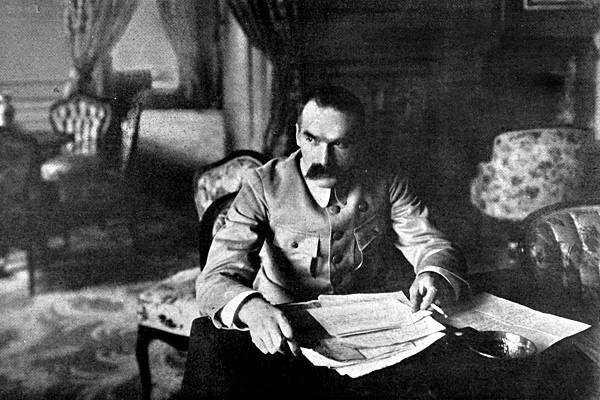
The brothers came from a noble Shlekheti family, their father during the Polish uprising 1863, was the Commissioner of the national government. After graduating from high school in Vilna, Jozef Pilsudski entered the Kharkov University in the medical faculty. Here he is adjacent to the People. In 1886, Pilsudski asks for a transfer to the Derpt (modern Tartu. - RP) university in Estonia, but without receiving an answer, returns to Vilna and joins the circle of local socialists. Bronislav Pilsudski, who studied in Petersburg, meanwhile, is part of a group of the People of the People, led by Alexander Ulyanov, who were planning an attempt on the life of Alexander III. Jozef himself, although, apparently, sympathized with the People, he was not initiated into the conspiracy. Nevertheless, after the disclosure of the terrorist cell, the future founder of an independent Poland receives five years of administrative exile with Eastern Sibyl, although it appears as a witness at the process of the People. The fact is that in Vilna, Józef Pilsudski helped several times with the placement of the People of the Terrorists from the terrorist group, the court regarded this as complicity in anti-government activities. The punishment for Bronislav Pilsudski was much more severe: at first he was sentenced to death, which was later replaced by 15 years of hard labor on Sakhalin.
After returning from Siberia to 1892, Jozef Pilsudski joined the Polish Socialist Party, and soon became one of its leaders. In 1900, he was arrested again, but mimics mental illness and flees from a mental hospital. By this time, Pilsudski, a staunch Polish nationalist, during the Russo-Japanese War, he travels to Japan and suggests creating a Polish legion of prisoners who would fight against the tsarist army. Between the two revolutions, Pilsudski led the militant groups that were involved, including expropriations. It was he who headed the independent Polish state in 1918.
Information